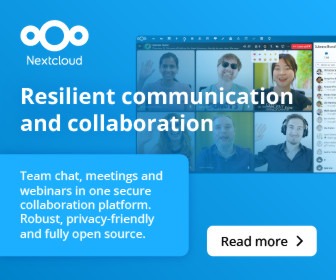Some of the biggest and most important FOSS projects are controlled by big business. Rarely does corporate ownership of free and open software work out completely in the interests of the user base, since corporate owners absolutely always have an agenda of their own. However, it works out better in some cases than in others.
Examples of the good, the bad and the ugly are easy to find.
Probably the best corporate ownership of free and open source products comes from Red Hat, for reasons that should be obvious. Red Hat makes their living developing and supporting FOSS products, so they tend to be excellent FOSS players, obeying both the spirit and letter of the GPL. In addition, they defend the license, because what’s good for free and open source software is good for Red Hat.
The other side of the coin, the bad players in the free software world, might be best represented by Oracle, who inherited a slew of important open source projects with their takeover of Sun Microsystems a few years back. As we’ve observed before, part of the problem with Oracle is that sharing and software freedom isn’t in the company’s genetic structure. Like many proprietary vendors, they believe in nurturing their clients by using the mushroom philosophy–that is by keeping them in the dark and feeding them plenty of malarkey.
Oracle also obviously has some conflict-of-interest issues when it comes to one of their most important FOSS offerings, the MySQL database, which probably steers at least half of the worlds websites. Oracle, of course, became one of the biggest companies in tech by selling their own proprietary database. Although in most instances Oracle’s database doesn’t directly compete with MySQL, we know it gripes Larry Ellison’s arse to be giving a database away when he thinks he could be making money selling it.
| [yop_poll id=”14″] |
In spite of the bad players, big business’ involvement in free software has probably been beneficial over all. Certainly, the Linux landscape was permanently changed for the better with IBM’s billion dollar investment in the early days of the 21st century. Big Blue has also been something of a role model for other companies looking to get involved in the open source marketplace, demonstrating it’s possible to maintain influence on the direction an open source project while respecting the GPL and the project’s independence.
At the same time, however, IBM has made moves that’ve seemed suspect to some. For example, many of us are still trying to determine whether their involvement in Oracle’s decision to deed the OpenOffice.org project to Apache was in our interest.
Most of us probably have one or two companies we distrust more than others. Often our reasons are known and shared by most, if not all, of us. For instance, Microsoft’s decades long FUD and patent wars against free and open source software makes most of us suspicious of their current moves into open source space. As a community, we distrust Redmond so much that there’s no doubt that if Microsoft were to come into possession of a major FOSS property though an acquisition, that project would be immediately forked by some FOSS developer in an attempt to keep control out of Redmond’s hands.
Who don’t you trust?
We’d like to know what you think. Who do you not trust the most? Into whose hands would you least like to see your favorite FOSS project fall?
In our poll we’ve included all the usual suspects. It goes without saying that Microsoft, Oracle and Novell are offered as choices. But we’ve also included born, bred and built on open source Red Hat, because we’ve learned not everyone has trust in their motives either. We couldn’t include every tech company under the sun, no one would want to scroll that far, so there’s the catchall “other” category, where you can fill in the blank with your favorite to hate.
After taking our poll, we’d appreciate it if you dropped down to make a comment, to let us know why you voted the way you did or anything else you think to be pertinent.







It was actually a tossup between Apple and Microsoft … so I called it in the air and the reindeer came up (Canadian injoke there.)
I’ve dusted off my Canadian thinking cap, but it doesn’t seem to be working at the moment, so I called Bob and Doug McKenzie, but they’d made a run for the Brewer’s Retail, and I don’t think either one of them owns a computer anyway. So I give up…
I tried….really I did…..to avoid picking on the company that MOST deserves to be distrusted, but it seems that after carefully considering all the OTHER companies, I feel that while it might be bad to have Oracle…..IBM…..Google…or Apple own a FOSS project…..that i just cannot stomach the thought of Micrisoft getting their hands on something pure, and fully-functional, and turning it into some bastardized, reverse-thinking, nightmare of an application or OS and then try to peddle it off as something beneficial to everyone….(at least until you forget to enter some archaic code during the install which will only give you access for 30 days, and after that the only thing that will work would be the web-browser,…so that you can go to their website and BUY an archaic code!…LoL! Sorry, its like I said before…i TRIED to pick on someone else, but no one else has the “dirty fingerprints” that incriminate MS….like….well….like Microsoft! LoL!
@Eddie G. Yup. No kidding! It’s really hard not to pick Microsoft for any bad guy role when it comes to FOSS. Even though these days in many ways they’re not the worst player anymore-you make a really good point and one that occurred to us while we were putting this poll together. As far as I know, thus far Redmond’s open source offerings haven’t been actual programs I’d put on my computer to use as a consumer–and I’m not sure I want to see one of those when it gets here. I would say more, but I probably want to save it for an article. However Eddie, you’re 100% spot on–and spoken with a great sense of humor. Thanks for making my morning Dude.
Does SAP belong on this list? I feel like it’s results are anomalous.
You’re correct Sahil – this may seem like a strange item on this list at first glance. However, although SAP hasn’t been a high profile player in the FOSS world, the company invests heavily in open source companies. The list of companies in which SAP has invested includes (2009 data) Alfresco, GroundWork, Intalio, JasperSoft, Zend and the Eclipse Foundation. Before that, the company had invested in MySQL and Red Hat.
In other words, although we may not normally think of SAP as an open source player, they are a huge enterprise software company with many open source interests.
Microsoft are the worse, pure and simple. They and their software-patent-troll proxies are the ones suing just about everyone and anyone using F/OSS. After that, it’s a tie between Apple and Oracle. Both have demonstrated about equal “badness” when it comes to F/OSS projects.
IBM, they don’t seem to care so much whether something’s F/OSS or proprietary, as long as they make money. I see them as basically neutral. Google, somewhat more toward F/OSS, but they’ll gladly make money off of proprietary works as well.
Novell is now pretty much a non-entity. SAP, I don’t really know much about them, so I can’t speak to them.
Sum Yung Gai, you’re pretty spot on. As for Novell, we’ll always feel a little indebted to the old Novell for defending Linux by doing battle with SCO. We also like the way Attachmate separated the operations of SUSE and Novell after the takeover, which has allowed SUSE to become an important GNU/Linux distribution again.
IBM, Google, and Apple all run a ton of OSS projects. Apple is in charge of both WebKit and cremember, ups (printing services for Unix). Apple has made some weird choices that ignore non-apple platforms, but nothing horrible. IBM and Google have both been great.
I’d rate the list from worst to best as Microsoft<Oracle<SAP<Apple<Novell<Google<IBM<RedHat
@bobpaul I agree, mostly, with your assessment of Apple as far as working on open source projects–except they tend to take more from open source than they give back. But they do so within the terms of the license, and a lot of their software choices seem to be based on license. They’ve turned into something of a patent troll in recent years, but I can’t see how that has anything to do with this poll so I’m not sure why I mention it.
I also agree with you on IBM. I think IBM has been a surprisingly good player and that the free software movement owes a debt of gratitude to them. They may be mostly motivated by their own self interests and that’s fine–the GPL might even encourage that.
I pretty much like the way you’ve ordered your list. In this era, however, I might switch Oracle and Microsoft, though I’m not adamant on that. Microsoft has certainly earned a place at the bottom forever if they want it. 🙂 And I’m not sure Oracle will remain the same company it is after Larry Ellison is no longer involved–but we’ll have to wait a while for that, I guess.
hey guys,
i am thinking to create an AI in linux 32bit in Python.
is this a great idea ‘:| ?
should i make my own electronic motherboard + programming, because is a very delicat thing ?
Why isn’t Canonical in this list, I’d probably trust them the least.